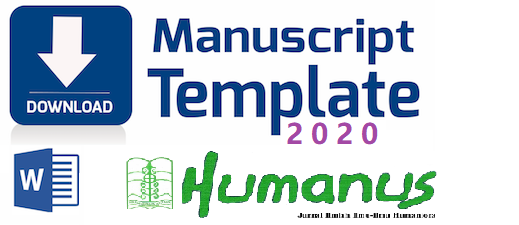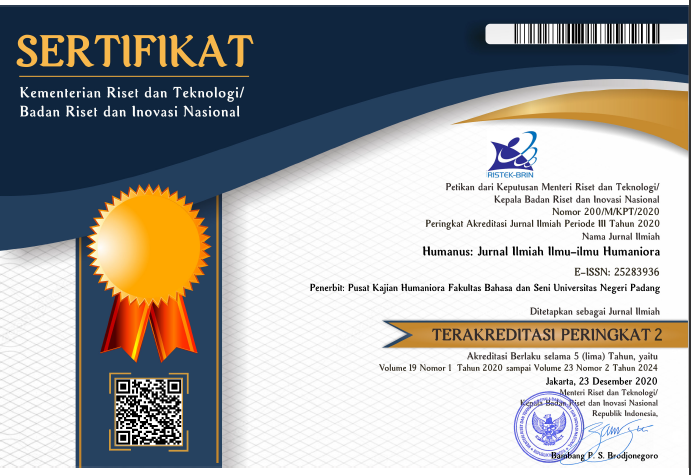Gender Equality in the Global Research Publication: The Bibliometric Review and Scientific Visualization
 ),
), (1) Universitas Muhammadiyah Yogyakarta
 Corresponding Author
Corresponding Author
Copyright (c) 2022 Humanus
DOI : https://doi.org/10.24036/humanus.v21i1.115645
Full Text:
 Language : id
Language : id
Abstract
human rights, namely “gender equality”. The language of “gender equality” was
mobilized by feminists as a way to incorporate women's rights into the international
development agenda. Using bibliometric analysis of scientific journal articles taken from
the Scopus database, which totaled 504 journal articles, this study aims to document
evidence of research activities in 2012-2021 in the Scopus database, and visualize it using
VOSviewer and NVivo 12 plus software. The article reports on the publication and its
citation structure, key trends, and its growing push toward co-authoring. This study also
visualizes the most prominent topics and authors in the form of a network, using
VOSviewer's bibliometric analysis and mapping of themes and their correlations using
NVivo 12 plus. The novelty of this research is the composition of limitations in the Scopus
database, as well as data processing using VOSviewer and NVivo 12 plus software.
Further research, it is necessary to enrich the composition of limitations in the Scopus
database, and compare it with the Web of Science database.
Keywords
References
Abbas, S., Zakar, R., & Fischer, F. (2020). Qualitative study of socio-cultural challenges in the nursing profession in Pakistan. BMC Nursing, 19(1), 1–7. https://doi.org/10.1186/s12912-020-00417-x
Alkire, S., Meinzen-Dick, R., Peterman, A., Quisumbing, A., Seymour, G., & Vaz, A. (2013). The Women’s Empowerment in Agriculture Index. World Development, 52, 71–91. https://doi.org/10.1016/j.worlddev.2013.06.007
Amrutha, V. N., & Geetha, S. N. (2020). A systematic review on green human resource management: Implications for social sustainability. Journal of Cleaner Production, 247, 119131. https://doi.org/10.1016/j.jclepro.2019.119131
Araújo-Vila, N., Otegui-Carles, A., & Fraiz-Brea, J. A. (2021). Seeking Gender Equality in the Tourism Sector: A Systematic Bibliometric Review. Knowledge, 1(1), 12–24. https://doi.org/10.3390/knowledge1010003
Aribowo, E. K. (2019). Analisis Bibliometrik Berkala Ilmiah Names: Journal of Onomastics dan Peluang Riset Onomastik di Indonesia. Aksara, 31(1), 85–106. https://doi.org/10.29255/aksara.v31i1.373.85-105
Bendels, M. H. K., Dietz, M. C., Brüggmann, D., Oremek, G. M., Schöffel, N., & Groneberg, D. A. (2018). Gender disparities in high-quality dermatology research: A descriptive bibliometric study on scientific authorships. BMJ Open, 8(4), 1–11. https://doi.org/10.1136/bmjopen-2017-020089
Carvalho, I., Costa, C., Lykke, N., & Torres, A. (2018). Agency, structures and women managers’ views of their careers in tourism. Women’s Studies International Forum, 71(December 2017), 1–11. https://doi.org/10.1016/j.wsif.2018.08.010
Chadegani, A. A., Salehi, H., Yunus, M. M., Farhadi, H., Fooladi, M., Farhadi, M., & Ebrahim, N. A. (2013). A comparison between two main academic literature collections: Web of science and scopus databases. Asian Social Science, 9(5), 18–26. https://doi.org/10.5539/ass.v9n5p18
Chung, H., & van der Lippe, T. (2018). Flexible Working, Work–Life Balance, and Gender Equality: Introduction. Social Indicators Research, 151(2), 365–381. https://doi.org/10.1007/s11205-018-2025-x
Ciccia, R., & Verloo, M. (2012). Parental leave regulations and the persistence of the male breadwinner model: Using fuzzy-set ideal type analysis to assess gender equality in an enlarged Europe. Journal of European Social Policy, 22(5), 507–528. https://doi.org/10.1177/0958928712456576
Cornwall, A., & Rivas, A. M. (2015). From ‘gender equality and ‘women’s empowerment’ to global justice: reclaiming a transformative agenda for gender and development. Third World Quarterly, 36(2), 396–415. https://doi.org/10.1080/01436597.2015.1013341
Craig, L., & Churchill, B. (2021). Dual-earner parent couples’ work and care during COVID-19. Gender, Work and Organization, 28(S1), 66–79. https://doi.org/10.1111/gwao.12497
Cuellar-Rojas, O.-A., Hincapié, M., Contero, M., & Güemes-castorena, D. (2021). Intelligent Tutoring System: A Bibliometric Analysis and Systematic Literature Review. Research Square, 1–33.
Eck, N. J. Van, & Waltman, L. (2014). Visualizing Bibliometric Networks. In Measuring Scholarly Impact. https://doi.org/10.1007/978-3-319-10377-8
Elihami, E., Sua, A. T., & Mahyuddin, M. J. (2021). Reconnoitering Education Literacy and Equality: Bibliometrics Analysis of the term “Education Literacy and Equality.” Journal of Nonformal …, 7(2), 200–206. https://journal.unnes.ac.id/nju/index.php/jne/article/view/32016
Fahimnia, B., Sarkis, J., & Davarzani, H. (2015). Green supply chain management: A review and bibliometric analysis. In International Journal of Production Economics (Vol. 162). Elsevier. https://doi.org/10.1016/j.ijpe.2015.01.003
Franceschini, F., Maisano, D., & Mastrogiacomo, L. (2016). The museum of errors/horrors in Scopus. Journal of Informetrics, 10(1), 174–182. https://doi.org/10.1016/j.joi.2015.11.006
Garrigos-Simon, F. J., Botella-Carrubi, M. D., & Gonzalez-Cruz, T. F. (2018). Social capital, human capital, and sustainability: A Bibliometric and visualization analysis. Sustainability (Switzerland), 10(12). https://doi.org/10.3390/su10124751
Gómez-Corona, C., Escalona-Buendía, H. B., Chollet, S., & Valentin, D. (2017). The building blocks of drinking experience across men and women: A case study with craft and industrial beers. Appetite, 116, 345–356. https://doi.org/10.1016/j.appet.2017.05.026
González-Torres, T., Rodríguez-Sánchez, J. L., Pelechano-Barahona, E., & García-Muiña, F. E. (2020). A systematic review of research on sustainability in mergers and acquisitions. Sustainability (Switzerland), 12(2), 1–18. https://doi.org/10.3390/su12020513
Hallinger, P. (2019). Science mapping the knowledge base on educational leadership and management in Africa, 1960–2018. School Leadership and Management, 39(5), 537–560. https://doi.org/10.1080/13632434.2018.1545117
Hallinger, P., & Suriyankietkaew, S. (2018). Science Mapping of the Knowledge Base on Sustainable Leadership, 1990-2018. Sustainability (Switzerland), 10(12), 1–22. https://doi.org/10.3390/su10124846
Herrera-Franco, G., Montalván-Burbano, N., Carrión-Mero, P., Apolo-Masache, B., & Jaya-Montalvo, M. (2020). Research trends in geotourism: A bibliometric analysis using the scopus database. Geosciences (Switzerland), 10(10), 1–29. https://doi.org/10.3390/geosciences10100379
Hockerts, K., Muñoz, P., Janssen, F., & Nicolopoulou, K. (2018). Advancing sustainable entrepreneurship through substantive research. International Journal of Entrepreneurial Behaviour and Research, 24(2), 322–332. https://doi.org/10.1108/IJEBR-03-2018-427
Jeong, D., & Koo, Y. (2016). Analysis of Trend and Convergence for Science and Technology using the VOSviewer. International Journal of Contents, 12(3), 54–58. https://doi.org/10.5392/ijoc.2016.12.3.054
Jhamb, D., Kampani, N., & Arya, V. (2021). Embracing the employee orientation: does customer relationship matter in brand building? Benchmarking. https://doi.org/10.1108/BIJ-12-2020-0614
Kataria, A., Kumar, S., & Pandey, N. (2021). Twenty-five years of Gender, Work and Organization: A bibliometric analysis. Gender, Work and Organization, 28(1), 85–118. https://doi.org/10.1111/gwao.12530
Keathley-Herring, H., Van Aken, E., Gonzalez-Aleu, F., Deschamps, F., Letens, G., & Orlandini, P. C. (2016). Assessing the maturity of a research area: bibliometric review and proposed framework. Scientometrics, 109(2), 927–951. https://doi.org/10.1007/s11192-016-2096-x
Knapczyk, A., Francik, S., Pedryc, N., & Hebda, T. (2018). Bibliometric analysis of research trends in engineering for rural development. Jelgava, 700–707. https://doi.org/10.22616/ERDev2018.17.N389
Li, H., An, H., Wang, Y., Huang, J., & Gao, X. (2016). Evolutionary features of academic articles co-keyword network and keywords co-occurrence network: Based on two-mode affiliation network. Physica A: Statistical Mechanics and Its Applications, 450, 657–669. https://doi.org/10.1016/j.physa.2016.01.017
Liao, H., Tang, M., Luo, L., Li, C., Chiclana, F., & Zeng, X. J. (2018). A bibliometric analysis and visualization of medical big data research. Sustainability (Switzerland), 10(1), 1–18. https://doi.org/10.3390/su10010166
Lundgren, S., Shildrick, M., & Lawrence, D. (2015). Rethinking bibliometric data concerning gender studies: a response to Söderlund and Madison. Scientometrics, 105(3), 1389–1398. https://doi.org/10.1007/s11192-015-1767-3
Machmud, M., Irawan, B., Karinda, K., Susilo, J., & Salahudin. (2021). Analysis of the intensity of communication and coordination of government officials on twitter social media during the Covid-19 handling in Indonesia. Academic Journal of Interdisciplinary Studies, 10(3), 319–334. https://doi.org/10.36941/AJIS-2021-0087
Majumder, N., Chaudhari, S. P., Pandya, M., Bhatt, A., & Trivedi, D. (2021). Measuring the Global Research Output and Visualization on Gender Equality: A Bibliometric Analysis. Library Philosophy and Practice, 2021, 1–21. https://doi.org/10.2139/ssrn.3915981
Montalván-Burbano, N., Pérez-Valls, M., & Plaza-Úbeda, J. (2020). Analysis of scientific production on organizational innovation. Cogent Business and Management, 7(1). https://doi.org/10.1080/23311975.2020.1745043
Nawangsari, A. T., Junjunan, M. I., & Mulyono, R. D. A. P. (2020). Sustainability Reporting: Sebuah Analisis Bibliometrik Pada Database Scopus. Journal of Applied Accounting and Taxation, 5(2), 137–157. https://doi.org/10.30871/jaat.v5i2.2182
Niñerola, A., Sánchez-Rebull, M. V., & Hernández-Lara, A. B. (2019). Tourism research on sustainability: A bibliometric analysis. Sustainability (Switzerland), 11(5), 1–17. https://doi.org/10.3390/su11051377
Nobanee, H., Hamadi, F. Y. Al, Abdulaziz, F. A., Abukarsh, L. S., Alqahtani, A. F., Alsubaey, S. K., Alqahtani, S. M., & Almansoori, H. A. (2021). A bibliometric analysis of sustainability and risk management. Sustainability (Switzerland), 13(6), 1–16. https://doi.org/10.3390/su13063277
Nurdin, B. V., Hutagalung, S. S., Yulianto, Kurniawan, R. C., & Hermawan, D. (2021). Bibliometric Analysis on Governance Index Topics Using Scopus Database and Vosviewer. Journal of Physics: Conference Series, 1933(1). https://doi.org/10.1088/1742-6596/1933/1/012047
Power, K. (2020). The COVID-19 pandemic has increased the care burden of women and families. Sustainability: Science, Practice, and Policy, 16(1), 67–73. https://doi.org/10.1080/15487733.2020.1776561
Rojas-Figueroa, A. M., Londoño-Gallego, J. A., Pérez-Betancur, N., & Gómez-Navarro, M. V. (2019). Analysis of the big data generated in the company’s social networks “sistemas Expertos SAS” using NVivo. Journal of Physics: Conference Series, 1418(1). https://doi.org/10.1088/1742-6596/1418/1/012004
Rossolatos, G. (2019). Negative brand meaning co‐creation in social media brand communities: A laddering approach using NVivo. Psychology and Marketing, 1249–1266.
Ruggieri, R., Pecoraro, F., & Luzi, D. (2021). An intersectional approach to analyse gender productivity and open access: a bibliometric analysis of the Italian National Research Council. Scientometrics, 126(2), 1647–1673. https://doi.org/10.1007/s11192-020-03802-0
Saleem, F., Khattak, A., Ur Rehman, S., & Ashiq, M. (2021). Bibliometric analysis of green marketing research from 1977 to 2020. Publications, 9(1), 1–19. https://doi.org/10.3390/publications9010001
Sulistyaningsih, T., Nurmandi, A., Kamil, M., Roziqin, A., Salahudin, Jainuri, Sihidi, I. T., Apriyanto Romadhan, A., & Loilatu, M. J. (2021). Formulating Sustainable Watershed Governance Model: A Meta-analysis of Watershed Governance. Academic Journal of Interdisciplinary Studies, 10(2), 90–104. https://doi.org/10.36941/ajis-2021-0041
Tang, M., Liao, H., Wan, Z., Herrera-Viedma, E., & Rosen, M. A. (2018). Ten years of Sustainability (2009 to 2018): A bibliometric overview. Sustainability (Switzerland), 10(5), 1–21. https://doi.org/10.3390/su10051655
Tupan, Rahayu, R. N., Rachmawati, R., & Rahayu, E. S. R. (2018). Analisis Bibliometrik Perkembangan Penelitian Bidang Ilmu Instrumentasi. BACA: Jurnal Dokumentasi Dan Informasi, 39(2), 135–149.
United Nations. (2015). Transforming our world: the 2030 Agenda for Sustainable Development. In United Nations: Vol. A/RES/70/1 (pp. 1–35). https://doi.org/10.1163/157180910X12665776638740
Utama, A. A., Pratama, D., & Noercholis, D. F. (2019). Pengabdian Masyarakat: Pelatihan Nvivo 12 Plus Di Psdku Unair Banyuwangi. Jurnal Kuat: Keuangan Umum Dan Akuntansi Terapan, 1(3), 151–154. https://doi.org/10.31092/kuat.v1i3.625
van Eck, N. J., & Waltman, L. (2017). Citation-based clustering of publications using CitNetExplorer and VOSviewer. Scientometrics, 111(2), 1053–1070. https://doi.org/10.1007/s11192-017-2300-7
Wayan, N., Dewi, P., Oka, A. A. N., & Gorda, S. (2021). The Bali Health Office Strategies Formulating : Reflection on The New Public Management. Enrichment: Journal of Management, 11(2), 433–446.
 Article Metrics
Article Metrics
 Abstract Views : 1200 times
Abstract Views : 1200 times
 PDF Downloaded : 219 times
PDF Downloaded : 219 times
Refbacks
- There are currently no refbacks.
Copyright (c) 2022 Humanus

This work is licensed under a Creative Commons Attribution-NonCommercial 4.0 International License.










